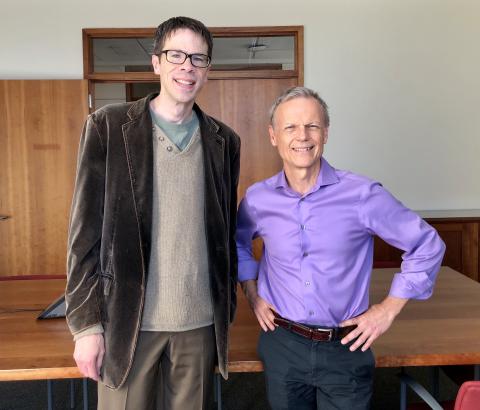
Randy Hall, a biochemistry major from the class of 1990, discovered his affinity for research almost 30 years ago, as an undergraduate in Professor Rick Cote’s lab. Hall is now a professor of pharmacology and chemical biology at Emory University School of Medicine and providing his students with the same support and inspiration he received back in his days at UNH.
Hall has co-written a book with Robert Lefkowitz, his postdoc mentor and a Nobel Laureate, titled A Funny Thing Happened on the Way to Stockholm: The Adrenaline-Fueled Adventures of an Accidental Scientist. The book is due to be released Feb. 2, 2021.
Below, Prof. Hall catches us up on what he's been doing since he graduated and shares thoughtful advice for students interested in a career in science or medicine.
Professor Randy Hall: I am a professor of pharmacology and chemical biology in the Emory University School of Medicine. After receiving my degree from UNH in 1990, I attended graduate school at the University of California at Irvine and then completed a post-doctoral fellowship at Duke University with Nobel Laureate Robert Lefkowitz. I joined the Emory University School of Medicine faculty in 1999 and have remained at Emory ever since. My laboratory's research focuses on the signaling and regulation of receptors in the brain. I have published more than 100 scientific papers and received a number of awards for my research. I have also won prizes for my teaching and have strong interests in science writing and public outreach about science and medicine.
Prof. Hall: UNH prepared me well to pursue a career in research. As an undergraduate, I had outstanding research opportunities and was fortunate to receive several undergraduate research awards that facilitated my research. The discussion-based upper-level courses that I took as an upperclassman at UNH taught me to think critically and served as excellent preparation for graduate school and beyond.
Prof. Hall: I had two main mentors at UNH. My research mentor was Rick Cote. He was a recently hired assistant professor at that time, and after taking a course with him I decided I wanted to work in his lab. As a mentor, Rick was incredibly dynamic and inspirational. I found his enthusiasm for research to be infectious. I worked in his lab for two years and received outstanding training in the fundamentals of research. Rick helped to ignite in me a passion for research that is still burning three decades later.
My other main mentor at UNH was my track coach Jim Boulanger. I ran cross-country and track all four of my years in Durham, and all during this time Jim was a nonstop force of positive energy. He helped instill in me self-discipline and time-management skills that have been incredibly useful in my later career. Jim is a legendary motivator, and now that I am a mentor myself I find myself using many motivational techniques that I learned from Jim during my track days at UNH.
For any students potentially interested in a career in science or medicine, my advice is to get as much research experience as you can. Classes are great and can provide a broad base of knowledge, but there is no substitute for conducting cutting-edge research yourself and trying to push the boundaries of knowledge.
Prof. Hall: The professional achievement of which I am most proud is that I have mentored more than 50 young scientists who have gone off to have wonderful careers in research and medicine. There is no doubt in my mind that my skills as a mentor can be traced directly back to the outstanding mentoring I received at UNH.
Prof. Hall: For any students potentially interested in a career in science or medicine, my advice is to get as much research experience as you can. Classes are great and can provide a broad base of knowledge, but there is no substitute for conducting cutting-edge research yourself and trying to push the boundaries of knowledge.
For admissions to the graduate program I now direct at Emory, we mainly look for undergraduates with a lot of quality research experience. GPA frankly doesn’t matter very much and we don’t look at standardized test scores (like the GRE) at all, so it’s mainly about having strong research experience and enthusiastic letters from your research mentors.
Learn More